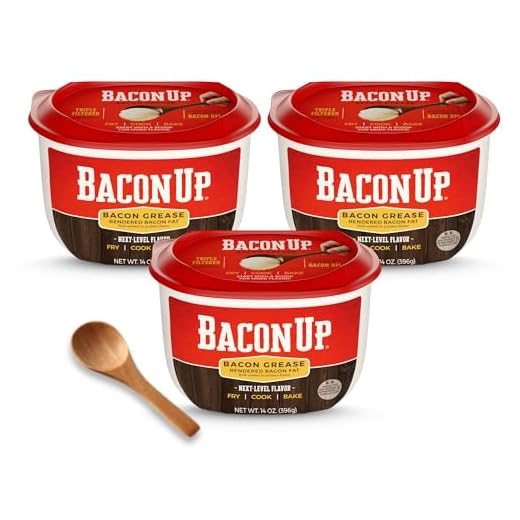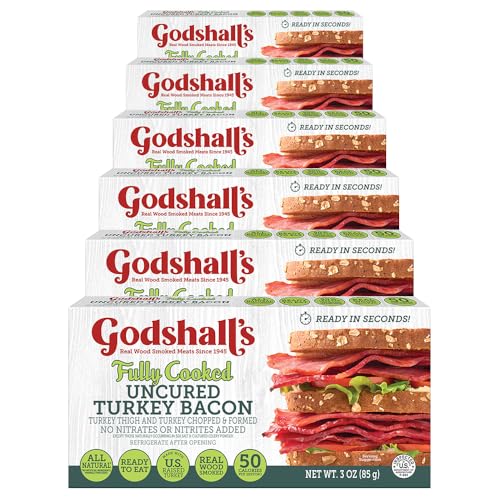



There’s a new trend in town when it comes to cooking bacon – cooking it in water. You might be thinking, why in the world would anyone want to cook bacon in water? Well, there are actually several reasons why this method has gained popularity in recent years.
First and foremost, cooking bacon in water helps to reduce the amount of fat in the final dish. By boiling the bacon, much of the excess fat melts away and is discarded. This can be a healthier option for those who are conscious of their fat intake or trying to make more nutritious choices in their diet.
In addition to being healthier, cooking bacon in water also helps to reduce the smoky flavor and aroma that is often associated with frying bacon. This can be a plus for those who enjoy the taste of bacon but don’t necessarily want their entire kitchen to smell like it for days on end.
Finally, cooking bacon in water can also make it easier to achieve the desired level of crispiness. By boiling the bacon first, you can then finish it off in the oven or on the stovetop to get that perfect level of crispiness without worrying about burning it.
So, whether you’re looking for a healthier option, want to reduce the smoky aroma, or simply want to make perfectly crispy bacon, cooking it in water might just be the method for you. Give it a try and see what you think!
Benefits of Cooking Bacon in Water
Cooking bacon in water is a unique technique that offers several benefits. While traditionally bacon is cooked in its own fat or butter, cooking it in water can result in a healthier and tastier outcome.
Healthier Option
By cooking bacon in water, you can reduce the amount of grease and fat in the final product. As the bacon simmers in water, some of the fat is rendered out, resulting in a less greasy and lighter texture. This can be advantageous for those who are watching their fat intake or following a healthier diet.
Reduced Splatter
One of the most significant benefits of cooking bacon in water is the reduced splatter. When bacon is cooked in its own fat, it can splatter and create a mess on the stovetop. However, by cooking it in water, the splatter is minimized, making the cooking process cleaner and safer.
Moreover, the reduced splatter also means that the stovetop and surrounding areas are easier to clean up after cooking.
Enhanced Flavor
Simmering bacon in water can result in a softer and juicier texture. The water helps to maintain moisture and prevents the bacon from drying out. This method can help to bring out the natural flavor of the bacon and create a more tender and delicious end result.
Additionally, the water can also act as a medium for infusing additional flavors into the bacon. You can add herbs, spices, or other ingredients to the water to create a more complex and flavorful bacon.
In conclusion, cooking bacon in water offers several benefits. It provides a healthier option with reduced grease and fat, minimizes splatter, and enhances the flavor of the bacon. Give this unique cooking technique a try and savor the delicious results!
Healthier Cooking Option
When it comes to cooking bacon, using water as opposed to frying it in oil offers a healthier option. Frying bacon in oil can lead to the bacon soaking up excess fat, resulting in a greasier and less healthy meal. However, cooking bacon in water can help reduce the amount of fat the bacon absorbs, making it a healthier alternative.
How It Works
By cooking bacon in water, the fat is rendered out more slowly and can be easily poured off. This reduces the overall fat content of the cooked bacon, making it a healthier option. Additionally, the water helps to keep the bacon moist and prevents it from becoming overly crispy or dry.
Here’s how you can cook bacon in water:
| Ingredients | Instructions |
|---|---|
| 1 lb of bacon | 1. Fill a large skillet with enough water to cover the bacon slices. |
| Water | 2. Place the bacon slices in the cold water. |
| – | 3. Turn the heat to medium-high and bring the water to a gentle boil. |
| – | 4. Cook the bacon until it reaches your desired level of crispness, flipping occasionally. |
| – | 5. Remove the bacon from the skillet and place it on a paper towel-lined plate to absorb any remaining water. |
| – | 6. Serve the bacon immediately and enjoy! |
The Bottom Line
Cooking bacon in water is a healthier cooking option as it reduces the bacon’s fat content and helps retain its moisture. By using this method, you can enjoy a delicious and crispy bacon without the excess grease. Give it a try and see the difference for yourself!
Reduced Fat Content
One of the main reasons for cooking bacon in water is to reduce its fat content. Bacon is known for being high in fat and calories, which can contribute to weight gain and other health issues. By cooking bacon in water, some of the fat from the bacon is released into the water, resulting in a lower fat content in the cooked bacon.
This method is particularly beneficial for individuals who are following a low-fat or calorie-controlled diet. By reducing the fat content in the bacon, they can still enjoy the flavor and texture of bacon without consuming excessive amounts of fat.
However, it’s important to note that cooking bacon in water may not remove all of the fat. Some fat will still remain in the cooked bacon, so it’s important to consume it in moderation as part of a balanced diet.
Additionally, cooking bacon in water may also help to reduce the amount of grease and smoke produced during cooking. This can be especially helpful for individuals who don’t want their kitchen filled with smoke or have concerns about grease splattering.
Overall, cooking bacon in water is a healthier alternative that can help to reduce the fat content and make it a more nutritious option for those watching their fat intake.
Crispy yet Tender Texture
One of the main benefits of cooking bacon in water is that it helps achieve a perfectly crispy yet tender texture. When raw bacon is added to a cold pan with water, the gradual heating process allows the fat to slowly render out, while the water helps keep the meat moist.
This unique cooking method helps prevent the bacon from becoming too dry and brittle, as sometimes happens when it’s cooked on high heat. The water also helps distribute the heat more evenly throughout the bacon, ensuring that it cooks evenly and doesn’t burn.
The result is a deliciously crispy bacon with a tender, juicy center. This texture is highly desirable, as it provides the perfect balance between crunchiness and tenderness, enhancing the overall taste and eating experience.
So, next time you cook bacon, consider using the water method to achieve that ideal crispy yet tender texture that will take your bacon dishes to the next level!
Less Smoke and Odor
Cooking bacon in water can significantly reduce smoke and odor compared to traditional dry frying methods. When bacon is cooked in a pan without water, the fat can quickly become hot and start to smoke, releasing strong odors into the air. By adding water to the pan, the temperature remains lower, preventing the fat from reaching its smoke point as quickly.
This reduction in smoke and odor can be particularly beneficial for individuals who live in apartments or have small kitchens with poor ventilation. It can help minimize the lingering smell of bacon that can permeate fabrics and surfaces, making cleanup and air freshening easier.
How does it work?
Cooking bacon in water involves placing the bacon strips in a pan with a thin layer of water and then heating it over medium-low heat. The water helps to create a gentle cooking environment that prevents the bacon from becoming too crispy and burning.
As the water heats up, it slowly evaporates, and the fat in the bacon starts to render and cook the meat. The water also helps to keep the bacon moist and tender, ensuring that it does not dry out or become overly greasy.
Easier Cleanup
Cooking bacon in water not only helps to reduce the amount of grease splatter, but it also makes cleanup much easier. When bacon is cooked in water, the fat and grease from the bacon will dissolve into the water, making it much easier to clean the pan afterwards. Instead of dealing with a greasy mess, you can simply drain the water and wipe the pan clean.
This is especially beneficial if you don’t have a dishwasher or if you’re cooking bacon in a skillet that doesn’t have a non-stick coating. By using the water method, you can prevent the grease from sticking to the pan and avoid the hassle of scrubbing off stubborn residue.
Additionally, cooking bacon in water reduces the amount of grease that ends up in your sink’s drain or in your trash can, which can help prevent clogs and potential plumbing issues. This can save you time and money on plumbing repairs in the long run.
Versatility in Cooking Methods
Cooking bacon in water may not be the most traditional method, but it highlights the versatility of cooking techniques. While frying bacon in a pan is the most common method, boiling bacon in water can offer different results and unique flavors.
Boiling Bacon
When you boil bacon, it becomes tender and juicy. The boiling process helps to remove excess salt, resulting in a milder flavor. Additionally, boiling can reduce the amount of fat in the bacon, making it a healthier alternative to frying.
Boiled bacon can be used in various dishes, such as soups, stews, and pasta sauces. The flavorful water, known as bacon broth, can also be used as a base for adding depth to other recipes.
Alternative Cooking Methods
Aside from boiling and frying, there are other cooking methods that can be used to prepare bacon. Grilling bacon can give it a smoky flavor and a crispy texture. Baking bacon in the oven is a popular method that allows for easy preparation and minimal mess.
Experimenting with different cooking methods can open up a world of possibilities when it comes to bacon. Each method offers a unique taste and texture, allowing you to customize your bacon to suit your preferences and the specific dish you are preparing.
Whether you choose to boil, fry, grill, or bake your bacon, it’s important to consider the final desired outcome. So next time you’re cooking bacon, don’t be afraid to try a new method and discover the endless possibilities it can bring to your meals.
Q&A
Why should I cook bacon in water?
There are several benefits to cooking bacon in water. First, it helps to reduce the fat content of the bacon. Second, it prevents the bacon from shrinking too much. Finally, it helps to keep the bacon moist and tender.
What is the process of cooking bacon in water?
The process of cooking bacon in water involves placing the bacon strips in a cold skillet and adding enough water to cover the bacon. Then, you bring the water to a boil and cook the bacon until the water evaporates. Finally, you fry the bacon in its own fat until it reaches the desired level of crispiness.
Does cooking bacon in water affect the taste?
Cooking bacon in water can slightly affect the taste, as some people claim that it removes a bit of the smoky flavor. However, it also helps to reduce the salty taste of the bacon. Overall, the taste difference is subtle and it mostly comes down to personal preference.
Can cooking bacon in water prevent splattering?
Yes, cooking bacon in water can help prevent splattering. The water helps to keep the bacon moist, which reduces the amount of fat that splatters when it heats up. This can be especially helpful if you’re cooking bacon in a skillet without a lid.
Is boiling bacon in water more healthy?
Boiling bacon in water can be considered a healthier cooking method compared to frying, as it helps to reduce the fat content. However, keep in mind that bacon is still a high-fat food, so it should be consumed in moderation regardless of how it is cooked.







